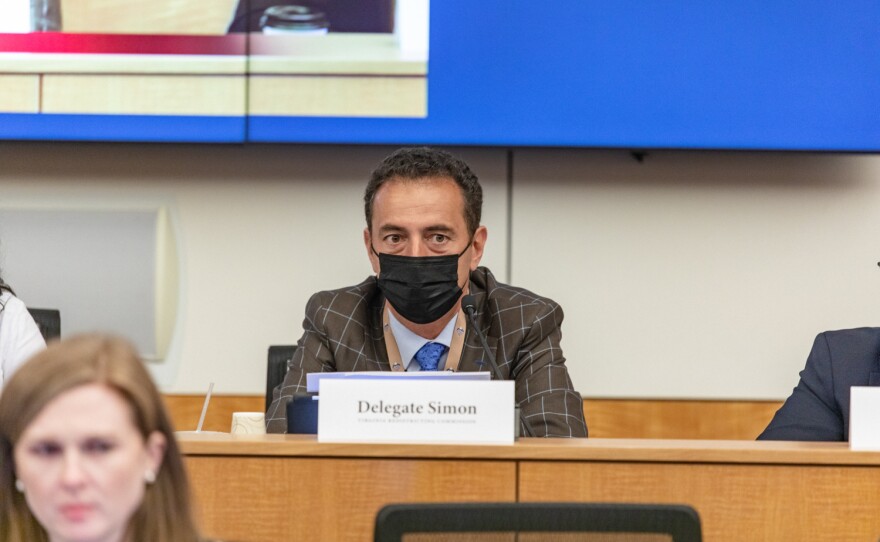A national Republican group helped former GOP Congressman Tom Davis craft a draft congressional map submitted to Virginia’s redistricting commission -- a fact that was not made clear to the public or members of the commission.
Davis was one of dozens of Virginians to submit a map last week for redrawing the commonwealth’s congressional districts. Critics of the map said it appeared to have particular sway with the commission’s Republican map-drawer, who also included some of the unique contours found in Davis’ map in a unified map presented with his Democratic counterpart on Friday.
Members of the Virginia Redistricting Commission found out Monday that Davis got help from the National Republican Redistricting Trust, the GOP’s main redistricting arm nationally. Some Democratic commissioners said the disclosure further eroded their trust in a process that has struggled to get off the ground.
In an interview, Davis said he was “an analog guy in a digital age” and so worked with NRRT staff to draft the product. “I gave them a bunch of criteria and they gave me options,” Davis said.
The commission did not take any votes on Monday related to the congressional maps because not enough members were present. The group gave up on state legislative maps earlier this month after Democrats accused Republicans of refusing to agree on a starting point for negotiations. Congressional maps are due on Monday, Oct. 25.
Tensions continued to simmer on Monday after Del. Marcus Simon (D-Fairfax) — a critic of the commission’s creation who now sits on the body — pointed to an email he obtained from commission staff showing Davis’ map was submitted by attorney Jason Torchinsky. Torchinsky works at the same firm as state Sen. Jill Vogel (R-Fauqier), who is not on the commission, and a 2017 POLITICO profile described Torchinsky as the senior advisor and general counsel at the NRRT.
“The person who submitted the map and a third party who is undisclosed as being a map-maker all colluded,” Simon claimed. “I don't understand how this could happen by coincidence.”
Bryan Tyson, an attorney for Republicans on the commission, said their map-maker — who previously helped Republicans draw House of Delegates districts in 2011 — had simply been following instructions to consider citizen maps. Tyson took umbrage at the accusation of collusion, which Simon later walked back.
“The idea that we've conspired with the NRRT to come up with this, you know, secret map — that's just patently untrue,” Tyson said.
Torchinsky and the NRTT could not immediately be reached for comment.
Davis, who represented parts of Northern Virginia in Congress from 1995 to 2008 “undefeated and unindicted,” dismissed the focus on the national GOP involvement as a “talking point” and argued his map should be taken on its merit. Davis noted he’d advocated for redistricting reform in a 2015 book and said he had never hidden the NRRT’s involvement in his map, pointing to the email obtained by Simon.
“Marcus Simon didn’t believe in this commission to begin with,” Davis said.
Republicans spoke highly of a map that emerged from the commission on Friday, a synthesis of regional maps drawn by the body’s GOP and Democratic map-drawers. Like Davis’ map, it showed five seats that favored Democrats, five that favored Republicans, and one toss-up, according to an analysis from the Virginia Public Access Project.
Democrats on the commission said that map didn’t make sense given the state’s political makeup; Democrats currently hold seven out of the state’s eleven House seats and have won every statewide election since 2009. Dave Wasserman, an elections expert with the nonpartisan Cook Political Report, called the finished product “a dream GOP map that would give Republicans a chance to win 6/11 seats in a Biden +10 state,” in a Tweet on Friday.
The commission spent much of Monday debating the meaning of a new state law saying the maps cannot “unduly favor or disfavor any political party.” Democrats interpreted the language to mean the maps should reflect their apparent electoral edge; Republicans argued it spoke to creating a more even split.
Those debates will continue in a meeting on Wednesday. If the commission can’t come to an agreement by their deadline, they get an automatic 14-day extension. If they still fail to reach consensus, the Supreme Court of Virginia takes over the process. If they succeed, the maps will head to the General Assembly for an up-or-down vote.



